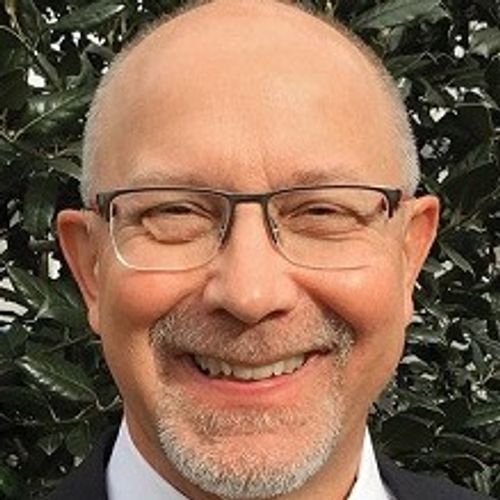full
Irena's Gift: How Love and Kindness Defied the Darkness of War
Karen Kirsten’s memoir 'Irena's Gift' offers a profound exploration of family secrets, trauma, and the quest for identity against the backdrop of the Holocaust. Raised by a Holocaust survivor, Kirsten grew up in a household characterized by silence and hidden truths, where questions about her family's past were often met with dismissal. This episode delves into her personal journey of uncovering the complexities of her heritage, which was shrouded in layers of fear and secrecy including the unexpected kindness from an SS officer who played a crucial role in her mother's survival.
Kirsten’s reflections encourage a dialogue about the nature of good and evil, as well as the legacies of trauma that can permeate through generations. Kirsten's story becomes a mirror reflecting the struggles of many who grapple with their ancestry while trying to forge their own identity.
- St. Louis Jewish Book Festival Events & Schedule | St. Louis JCC
- Tickets to Karen Kirsten Presentation at the Jewish Book Festival
- Karen Kirsten Website
This is Season 7! For more episodes, go to stlintune.com
Links referenced in this episode:
- jccstl.com
- karenkirsten.com
#holocaust #holocaustsurvivor #jewishhistory #australianjewishcommunity #generationaltrauma #kristallnacht #nazirescuestories #warsawghetto
Transcript
What do you do if you find out that the parents who raised you weren't actually your parents and the life that you grew up believing wasn't exactly the truth? We're going to find out more today on St. Louis in Tune. Welcome to St.
Louis in Tune and thank you for joining us for fresh perspectives on issues and event with experts, community leaders and everyday people who make a difference in shaping our society and world. I'm your host Arnold Stricker along with co host Mark Langston.
Karen Kirsten is an Australian American writer and Holocaust educator who speaks on the topics of hatred and reconciliation around the world.
Her essay Searching for the Nazi who Saved My Mother's Life was selected by Narratively as one of the best ever stories and nominated for the best American Essays.
Her writing has appeared in Salon.com the Week, the Jerusalem Post, Boston's National Public Radio Station, the Boston Herald, the Christian Post, many, many more. And she was raised in Australia by a Holocaust survivor mother and grandparents who silenced her questions about extermination camps.
Karen lived among refugees who were hiding horrible secrets to reinvent themselves and we're going to talk to her today about her book Arena's Gift, an epic World War II memoir of sisters, Secrets and Survival. She's going to be speaking at the Jewish Book Festival November 10th at 7:30pm at the Mirowitz Performing Arts Center. Karen, welcome to St.
Louis in Tune. I'm glad you're joining us today.
Karen Kirsten:Thank you Arnold. It's just a pleasure to be here.
Arnold Stricker:Now one of the things in reading the book was very interesting to me is that your background was hidden from you and it was really hidden from your mother. And why did you attempt to investigate this and then write the book about that?
Karen Kirsten:The subject we're talking about I think made me really curious right from the beginning. I was always asking questions.
When I was around 4 years old I remember sitting in my kitchen, my grandparents kitchen, and my grandmother was chopping vegetables for a poop and I asked her about the green blue numbers on her arm and she didn't blink. She said to me, oh that's my phone number. I had it tattooed there especially so I'd never forget my phone number.
And that's what it was like constantly. Everything I asked them about.
My grandmother had a large red mark on the side of her neck and I went once I'd learned a little bit about what happened during the Holocaust, I asked her if the Nazis did that to her and she told me it was a birthmark. I didn't know back Then that she had been in Ravenstroff after Auschwitz, where they did some pretty horrible experiments on the inlet.
And so my grandparents were holding everything in behind it, the walls of silence. And it wasn't until Schindler's left my grandmother, when the film came out, she asked me to take her, not my mother or her son.
And it was a week later she asked me to take her out to a restaurant. And we were eating dinner and she started telling me about Dr.
Mengele and how he would line the Auschwitz prisoners up on the assembly plot for hours in the snow, and he would infect them with his white blobs and whip. And I had never. Nobody. She had never told it to anybody body before.
And it was after I moved to the US that I called her and asked her if she'd let me interview her. And I flew back for vacation to Australia. And it was over a week. She told me her story.
And on the very last day, she said to me, I'm really worried that what happened to me will happen again. Do you think someone will want to know all of this? And that's why I decided to tell her story. And when I made her the promise that I would tell her.
Arnold Stricker:Now, how old were you when you asked her the question about what was on her arm and what was on her neck?
Karen Kirsten:I was around four, somewhere between four and four and a half years old. When I asked her about the tattoo, the question on the Nacra probably would have been about 10 or 11.
Arnold Stricker:So she had confidence in you rather than your mother, to take her to Schindler's List. And you must have had a close relationship or a different relationship than your mother had with her.
Or maybe you were asking questions and your mother was not, or why did she ask you to do that?
Karen Kirsten:That's incredible. That's really interesting. The answer to that is that. And this is really the focus of the. What I explore in Irena's Gift.
One of the other mysteries in my family was that my grandmother adored me. She would. I stayed over once a week, once every two weeks, and she would take me to the beach. She would.
We would go to the ballet, to concerts, to cafe together. And she talked, always talked down to my mother. She would laugh at her, and I could never understand why.
And so the central question I explore in Irena's Gift when I learned that how my grandmother risked my life during her life over and over during the war to save my mother, why did she dislike her so much? And I think she, you know, I don't know this because she didn't tell me. But I think I was the curious child in the family. I was.
Always had my nose stuck in a book.
And I think she knew that I would later on be curious enough to delve into the bits of her story that she wasn't able to tell, to tell into those gray areas, and that I would somehow figure out all the things in her life that she hadn't been able to describe to anybody else.
Arnold Stricker:Wow. Now was your grandfather still alive at that point?
Karen Kirsten:My grandfather died when I was 21 years old. And so I knew nothing about his life during the war. I didn't know that he.
asn't able to practice in the: fter the war, I discovered in:And when they asked him in English, this is my grandfather. Wow. When they asked him in, why are you here as a prisoner in Dachau? And my grandfather was atheist and he said, because I'm a Jew.
And that actually was the catalyst to me really getting off my butt and going to Poland to find people who would save my mother during the war to piece together the mystery of my family. The Bible?
Arnold Stricker:No. And what are the odds of that happening that you actually see your grandfather on a reel from the war? That's, that's so totally strange.
That's unbelievable.
Karen Kirsten:It was unbelievable. And it's a really, it's a. He speaks for 15 minutes.
Arnold Stricker:Wow.
Karen Kirsten:In English. And he describes. Now this is a man who I knew nothing about really. And he speaks for 15 minutes.
One of the things he, he did with the prisoners and my mother told me this later, is that at night in the barracks, he, because he was a lawyer, what kept him alive was the prospect of bringing the criminals to justice. And he would make the men recount the names of and their crimes.
And so they repeated them over and over so that after the war he wanted to prosecute them. And indeed after the war, the U.S.
army hired him to be administrative director of the war crime branch, and he was responsible for helping them prepare for the Dachau and Nuremberg trial.
Arnold Stricker: never knew any of that until: Karen Kirsten:It took me 10 years to research and write Irina's Gift.
me, I discovered the video in:And nobody in my family had ever seen some clip.
Arnold Stricker:Wow, that really speaks to the. You write about this. If we seal off the past, how will we ever know the truth?
And I have some words underlined, like generational trauma and silence and hidden history and pain and secrets.
And I think about many in that generation, even that came through the Depression that were quiet about things that happened in their past, whether they were shameful, they were ashamed of what they did or what happened or how they lived or what do you think this was? Or was this too much trauma in their lives that they were not able to talk about it because of what it would do internally to them?
And bringing it all back up, what are your thoughts on that?
Karen Kirsten:I think how you described it is absolutely correct. And it's obviously very different for anybody who survived all their reasons for holding things in.
I think back then, people who went through the camp, they couldn't believe themselves what had happened to them, what happened to them. So how on earth could they explain it? Others. But I think it's a theme, and I have worked with refugee. I do work with a volunteer with refugees.
And it's a common theme when you come to a new country and you have to start over again and find a job and often do something that you did differently in your. In your home country. And you've lost everything. You have to put the path behind you in some way and hold it in to just move forward to survive.
And back then, certainly in Australia, there were no therapists or counselors to help survivors deal with what with their nightmares and their traumas. Now, at least we're a little bit more sensitive to that.
But they just, they did what they had to do to move forward and create a life for their children, a better life for their children.
Arnold Stricker:I think we're familiar with refugees coming to the States after the war. Many people here, probably in the United States, aren't familiar as much that refugees went to Australia also.
How many Jewish refugees went to Australia after the war?
Karen Kirsten:Roughly right here accepted proportionally to the population. The second largest number of republical survivors after Israel they were before the war there were.
They had a quota of 35,000 visas for people after Kristallnacht trying to escape Europe. Now that shut down, that program shut down once Nazi Germany invaded Poland and the war started.
isters managed to get out mid-:So the whole larger population in Australia, although is, and I may be getting this wrong, may have to look it up later, but it's around 110,000, which is much smaller than the U.S. the obviously the number of Jewish people in the U.S. but because they lived in a high in two cities. I grew up in Melbourne.
They were in my grandparents home. I just remember drinking coffee with lots of people who had numbers on their arm, but none of them were religious. Many of them were atheists.
And so I grew up thinking of them more as Polish and Hungarian, not as Jewish.
It wasn't until I moved to the US and I live in the Botan area and for the first time I went surrounded by and worked with people who identified as Jewish. So that was a big shock for me because I'd never heard of Hanukkah or Rosh Hashanah or anything like that until I moved to the U.S. wow.
Arnold Stricker:We're talking to Karen Kirsten. She's the author of Irena's Gift, an epic World War II memoir of sisters, Secrets and survival.
She's going to be speaking November 10th at 7:30pm in the Jewish Book Festival. And it's in remembrance of Kristallnacht and Karen. Can you tease the audience, our listeners, a little bit about really what the book is about?
I know we've delved into it a little bit and teased that a little bit, but give us a little bit more details because you do go into some detail about your mom and Canada and your mother's real father.
Karen Kirsten:Sure. There's a lot of hope and love in Irena's Gift.
It is in the background of the Holocaust, but it's really about, as Geraldine's book, a Pulitzer Prize winning author said, it's about complicated, messy family. It's really about what happened when my mother asked her. My mother received this letter from a stranger when she was 32 years old.
And this man wrote to her and said that during the war as a law. She had been rescued by a notorious Nazi SS officer and that her mother, Irina, had been murdered.
And if that wasn't enough to give my mother a heart attack, the mother said that the people she thought were her parents were actually her aunts and uncles. And my mother kept all of that secret. A teenager when I found out that the grandparents I adored were not my biological grandparents.
So it's really about the lies we tell to protect innocent children and ourselves and what happens when those lies unravel.
That it's also a testament to the power of empathy, hope, and love that binds us together through the worst imaginable circumstances, and that also resonates through each kind. It's really also about the heroes who saved my mother and the power of empathy and kindness to save Nicholas Mars.
Arnold Stricker:And it seemed like there was a little empathy, albeit the passing of some kind of monetary or favorite, for the SS officer to allow this all to happen. Correct?
Karen Kirsten:Yeah. One thing that I love when I talk to students in school, I tell them the story of this SS officer who saved my mother's life.
And I won't give too much away for you listeners, but when the student asked me, I think he was a evil man or a good man. And I think it taps into the nuance in the book that history and human behavior and identity is nuanced and complicated.
That ensemble's officer killed women, tortured women, but he saved my mother, a Jewish child. And it. It also highlights when I talked to you earlier about the complexity relationship my grandmother had with my mother. My.
My grandmother really is the hero in the. What happened with the Nazi SS officer did. And she is really the one who saved my mother's life, not him.
Arnold Stricker:That's true. That's true. I'm going to correct myself on that. What. Did your mom ever know who this person was who wrote this letter or just come out of the blue?
Karen Kirsten:Yeah, she had. She didn't. She. The address came from Canada, this man in Canada, and he turned out to be her biological father.
Arnold Stricker:That was probably another shock.
Karen Kirsten:It was a horrendous shock. My father described it as he thought my mother had cut herself for the knife because she was screaming in the kitchen when she got this letter.
She had always felt like she didn't belong to the family. They were reunited after the war.
My mother was extracted from Poland and they lived in Germany for a number of years while my grandfather was working for the US Army. And they. She would have these nightmares that they shut down for years of hiding in dark rooms and of men in jackboots.
And they shut down all her questions about the war where she was she. Because they treated her so differently from her brother. She felt like they had collected the wrong child from Poland.
And of course, when this letter arrived, that's where she screamed this sense of orphanhood, which is really common apparently with child survivors of the war, this sort of blitz identity. Everything made sense to her when she got this letter. And she described it to me as a weight just lifting off her shoulders.
Her shoulders, not her shoulders.
Arnold Stricker:I can't imagine living a life and then finding out all these things. Maybe you think that the life that you've lived is a lie or you've been lied to. And how did your mom deal with all of that?
Karen Kirsten:My mom is a really bubbly, optimistic woman who always saw the best in people.
And despite her emotional scars in the war, she was the kind of person who was always planning hard act, delivering casseroles when people were sick and picking up their kids from school and. But she also had this sort of anger deep inside her. And I think she really, I.
We saw that behind closed doors, which is that anger of holding things in is very typical for Holocaust survivors and people who survived war. And I think she dealt with by. Through reaching out to other people and being apathetic towards other people.
She also, and this is a very something interesting in the book, she also had a really strong faith. And it wasn't initially a Jewish faith she encountered growing up a teenager, a Christian family at her school who showed.
Who hugged her and showed her physical love, the kind of love that she didn't receive at home, being raped by these damaged Holocaust providers. And so she converted at 15 years old. And that only alienated her more from her atheist Jewish Karen.
So her faith community, the church that eventually she belonged to in her when she was in her 30s, I think sustained her as well. And she did when I took her back to Poland to reunite her with some of the people that she. That saved her during the war.
And the more she learned about what had happened to her, she reconnected with her. She was later in life.
Arnold Stricker:And your mom is still alive?
Karen Kirsten: rtunately. She parked away in: Arnold Stricker:You've uncovered a treasure trove of things and you were able to really provide some what I would say, possible closure for your grandparents, a possible closure for your mom. What has that done for you?
Karen Kirsten:I spent 10 years studying the best of human behavior and the worst of human behavior. And to me, the people who saved my mother do so extreme record for themselves and for Me it the power of that.
I wouldn't be talking to you if a few people hadn't have shown kindness and empathy towards my mother instead of hate. And that to me is has been the most inspirational thing of it in the 10 years I've been working on this project.
Arnold Stricker:I'm trying to speak to those people who would be listening to this and wondering what will I get out of this book when I read it? What would you tell them?
Karen Kirsten:I think they'll be inspired by the power of love and the power of empathy and kindness that the man who risked his life to smuggle help smuggle my mother out of the Warsaw ghetto and then found her parents a place to hide outside of Warsaw, she didn't do that. He did that in incredible risk to his own life. And I think he didn't do it because they were Jewish.
He just did it because it was the right thing to do. And so I think people will be inspired by these everyday people. And he wasn't the only one.
There were other people who risked their lives to save my mother. And again, they didn't see my mother after her mother was killed. They didn't see my mother as a Jewish child.
They saw my mother as a sick child, a hungry child, a little girl crying for her mother. And that kind of empathy is what we need more of in the world today.
And I think that's what will inspire people when they read this book is the power of empathy and kindness to bring us together, but also to save people's lives because it saves my mother's life.
Arnold Stricker:Well said. We're talking to Karen Kirsten. She is the author of Arena's Gift, an epic World War II memoir of sisters, Secrets and Survival.
She's going to be speaking November 10th at 7:30pm at the Jewish Book Festival and it's entitled in remembrance of Kristallnacht. You can also find out more about her on Karen Kirsten.com K A R E N K I R s t e n.com for the Jewish Book Festival.
You could go to jccstl.com Karen, thank you very much for your time today and we appreciate you being on St. Louis and tune.
Karen Kirsten:Thank you, Arnold. It was an absolute pleasure.
Arnold Stricker:That's all for this hour and we thank you for listening.
If you've enjoyed this episode, you can listen to additional shows@st.luntune.com Please consider leaving a review on Apple Podcasts, Podchaser or your preferred podcast platform. Your feedback helps us reach more listeners and continue to grow. Want to thank Bob Berthazel for our theme music co host Mark Langston.
And we thank you for being a part of our community of curious minds. St. Louis in tune is a production of Motif Media Group and the US Radio Network.
Remember to keep seeking, keep learning, walk worthy and let your light shine. For St. Louis in tune, I'm Arnold Str Trickery.





